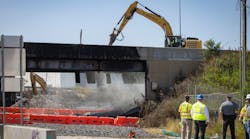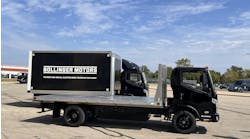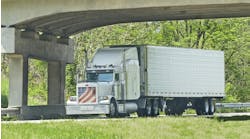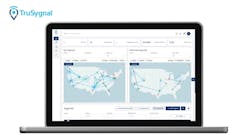The East Coast could be the center of the latest supply chain problems in the U.S., according to state and federal officials who have surveyed the devastation to Interstate 95 after a portion of the highway collapsed in Philadelphia this weekend.
Delays and detours associated with the major highway's closure could slow goods movements in and around the Northeast, increasing costs for consumers already facing inflationary pressures for more than a year, Transportation Secretary Pete Buttigieg said this week.
The highway's collapse, caused by a fire from a gasoline-hauling tank truck that crashed beneath the highway overpass, also returns the trucking industry's attention to another aspect of rising costs for trucking companies: nuclear verdicts.
See also: NFL QB's highway death puts trucking maintenance on trial"We've been exposed to it, and attorneys are out there filing all these lawsuits," Harold Sumerford Jr., chief executive of J&M Tank Lines, told Bulk Transporter, a FleetOwner affiliate. "So, the burden we have, just protecting ourselves against the exposure for what we're doing, is huge. And until we see some kind of tort reform to put a bridle on these unscrupulous attorneys, that's our biggest nightmare.
"You just look at that accident up on 95 the other day. That's going to be a major expense for somebody now," he continued. "That's part of doing business, but I'll be curious to see how many plaintiff attorneys jump in here and try to make money off this tragic situation."
A 2020 ATRI report found that between 2010 and 2018, plaintiff awards in truck-related suits increased from $2.3 million to $22.3 million—about a 1,000% jump. From 2010 to 2019, Florida, Texas, and New York combined to have 575 verdicts over $10 million, according to the U.S. Chamber of Commerce Institute for Legal Reform.
"That's the biggest thing that concerns me right now—these nuclear verdicts, huge lawsuits, and when good companies have something bad happen to them, how do you compensate the injured parties without overcompensating a bunch of attorneys?" asked Sumerford, a past chairman of American Trucking Associations and National Tank Truck Carriers.
'Outsized impact' on freight movement
Construction crews began demolishing what remained of the I-95 bridge this week after the massive petroleum-fed fire caused the northbound side to collapse and heavily damaged the southbound side. That portion of I-95, which extends from Maine to Florida, typically has 160,000 vehicles—including about 13,000 tractor-trailers—pass over it daily.
After touring the site on June 13, Buttigieg said the destruction has "an outsized impact on commuters and on goods movement up and down the I-95 corridor."
"Part of what goes into the cost of everything that we pay for in the store is the cost of shipping, and if a route is disrupted or if it's longer, or if trucks have to wait, that finds its way into the cost of goods," the secretary said. "There's no substitute for I-95 being up and running in full working condition."
Pennsylvania officials said it could take months to repair the highway, part of the crucial freight corridor between New York and Washington, D.C. The demolition of the remaining section of the highway is expected to be completed on June 15, according to the Pennsylvania Department of Transportation, which is streaming a live video of the work on its website.
PennDOT announced on June 14 that it hired an engineer to backfill the highway gap, which will be "paved over and reopened safely and as quickly as possible. Once complete, cars and trucks can return to this portion of I-95 as crews work to rebuild a permanent bridge while keeping six lanes of traffic flowing at all times."
"This was an enormously intense fire underneath a structure that, to my understanding, is relatively new in its construction," Buttigieg said of the bridge, which officials estimated was updated within the past 12 years. "Beyond that common-sense level, that we know what happened underneath this section of highway, I don't want to get ahead of the work that NTSB is doing."
The inherent risk of hauling flammable materials
Tank truck driver Nathan Moody, who died in the crash, lost control of the TK Transport tanker while exiting I-95, causing the vehicle to turn over and igniting the 8,500 gallons of gasoline he was hauling. Moody was the lone fatality reported from the scene.
Investigators and other officials declined to comment if speed was a factor in the crash. The National Transportation Safety Board (NTSB) intends to publish an initial report in about two or three weeks.
See also: 'Nuclear' verdicts roil and rile truckingTanker fleet executive Sumerford said he knows little about TK Transport, a small fuel-hauling fleet based in Pennsauken, New Jersey. He said it was obvious something had gone wrong. That brings him back to how nuclear verdicts are becoming a bigger problem for the trucking industry because a fuel truck crash gets much more attention than a dry van hauling paper goods.
According to a 2022 NTTC survey of more than a quarter of its member fleets, tanker fleets had a DOT recordable accident rate of 0.284 accidents per one million miles traveled in 2022. The industry average for large trucks and buses in 2020 was 12.1.
"The minimum insurance for everyone should be high enough that we're able to financially back our actions, for anything we've done, but sometimes we're competing against jobbers, for example, who have hardly any insurance, compared to what we carry," Sumerford explained. "And had that been a jobber, a private deal, they very easily could have had the minimum insurance, and maybe never been able to cover themselves.
"When you're hauling flammable materials, you're going to have things that happen. There's nothing you can do about it."
FleetOwner affiliate Roads & Bridges, an Endeavor Business Media publication, contributed to this article.





